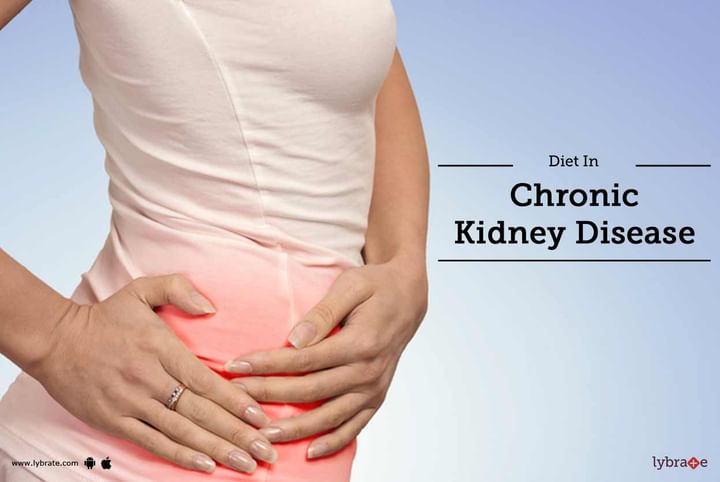Diet In Chronic Kidney Disease
What is Chronic Kidney Disease?
Chronic Kidney Disease (also known as Chronic Renal Failure) is the progressive loss of kidney function occurring over a span of several months to several years and is characterized by the replacement of kidney architecture with interstitial fibrosis.
Chronic kidney disease is classified into five stages on the basis or proteinuria (presence of protein in large amounts in the urine) or Glomerular Filtration Rate (GFR) - 1 being the mildest with no distinct symptoms and 5 being an end-stage renal failure.
Causes and Risk Factors of Chronic Kidney Disease-
The various reasons (called risk factors) that can increase the chances of Chronic Kidney Diseases are:
- Diabetes mellitus, hyperlipidemia (excess fat proteins in the blood)
-
Family history heritable renal disease
-
Older age, smoking
-
Autoimmune disease
-
Past episodes of acute renal disease
The direct causes of Chronic Kidney Diseases are-
-
Diabetic nephropathy (leading cause)
-
Hypertensive nephropathy
-
Glomerulonephritis (swelling of the glomerulus in the kidneys)
-
Reno-vascular disease (ischemic nephropathy)
-
HIV-associated nephropathy
-
Transplant allograft failure
-
Exposure to drugs and toxins
Diet that you must maintain in Chronic Kidney Disease-
It is essential to make dietary as well as lifestyle amends once you are diagnosed with CKD. The main purpose of this diet is to maintain the levels of carbohydrates, fluids, and minerals. This is done to prevent the buildup of waste products in the body as the kidneys are unable to fulfill its function properly.
It is recommended to refer a dietician who can make you a diet chart that helps you adhere to your diet.
Here is a list of food items that you may avoid or may consume if you are suffering from Chronic Kidney Disease:
-
Carbohydrates: Carbohydrates are a good source of energy. If the intake of protein has been restricted, then it is recommended to replace that with carbohydrates as a source of energy. Fruits, vegetables, grains, and bread can be consumed as they are a rich source of fibers, minerals and various types of vitamins. You can indulge in some hard candies or sweets as well.
-
Fats: Fats can provide a good amount of calories as well. Ensure that you only stick to healthy fats such as the monounsaturated and polyunsaturated fats that are good for your cardiac health.
-
Reduce your phosphorus intake: A diet with no more than 800 mg of phosphorus can help reduce the risk of too much phosphorus building up in your blood. Limit intake of foods with high levels of phosphate or phosphate additives such as organ meats, whole grain bread, processed foods, cola beverages, cheese, dried beans, liver, peanut butter, dairy products, and chocolate. Many beverages and processed foods have these additives. Other high-phosphorus foods to limit include:
- Cheese
- Chocolate
- Ice cream
- Legumes
- Milk
- Nuts
- Seeds
- Yogurt
- Monitor your potassium levels: Usually, potassium is not restricted in stage 3 CKD unless lab tests show potassium is too high. Your doctor may make medication changes or prescribe a low-potassium diet. Reduce an elevated potassium level by limiting some high-potassium foods and potassium chlorides (found in salt substitute and many low-sodium processed foods), such as avocado, bananas, cantaloupe, honeydew, legumes, milk, nuts, potatoes, seeds, tomato products, and yogurt. Some high-potassium foods to limit or avoid include:
- Avocado
- Bananas
- Cantaloupe and honeydew melon
- Dried fruit
- Legumes
- Milk
- Nuts and seeds
- Oranges and orange juice
- Potatoes
- Pumpkin and winter squash
- Tomato products (juices, sauces, paste)
- Yogurt
- Proteins: Usually, before undergoing dialysis, it is recommended to adhere to a low-protein intake diet. However, when you are undergoing dialysis, it is necessary to consume a certain amount of protein. This detailed information can be obtained from your dietician.
-
Fluids: In the early stages of CKD, your fluid intake is not monitored. But as the disease progresses, you need to check your intake of fluids as too many fluids may accumulate in your body and create pressure on your kidneys.
- Sodium Or Salt Intake: Keeping a check on your salt intake reduces the risks of high blood pressure. Also, having food low on salt can reduce your thirst and prevent fluid retention in your body.



+1.svg)
